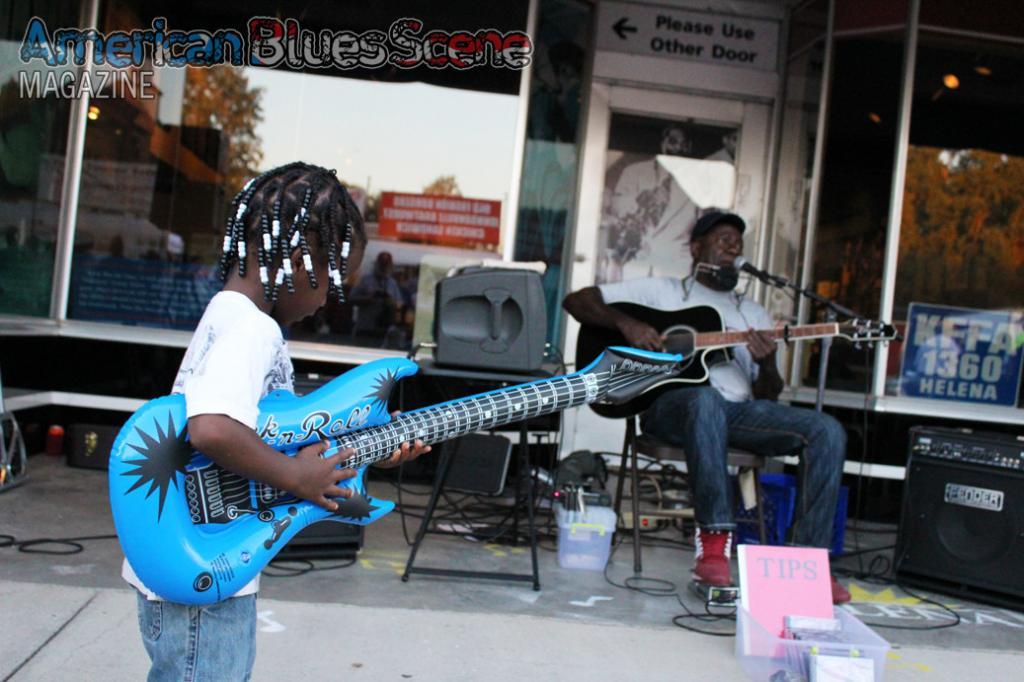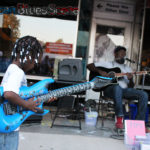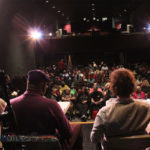
Robert Cray’s Hooker-like licks resounded across the starlit Mississippi River a half mile from where Conway Twitty’s daddy used to ferry Delta bluesmen across the wide expanse into Helena, Arkansas. Two blocks away on Cherry Street – the main street time forgot – a wide-eyed and slack-jawed two-foot-tall toddler made tentative steps out of the crowd. His crouching mom smiled and urged him toward a 300-plus pound man in overalls singing and playing harp as if he could single-handedly take over the whole King Biscuit Blues Festival, and for about 50 people he did. The sweat matted to his forehead, he blew into his harmonica, moved like a linebacker who refused to be taken down and bellowed out Muddy Waters and Howlin’ Wolf licks with the kind of abandon that makes you believe he was inventing the songs on the spot.
As “Sunshine” Sonny Payne announced every noontime, “It’s King Biscuit Time.” At the Best Western Motel in West Helena I asked a man at breakfast how many times he’s been to The Biscuit. He said it was his seventh. He also regularly goes to the New Orleans Jazz and Heritage Festival. Which did he like best? “That’s like asking who’s your favorite child,” he said without cracking a smile. Then he looked down at his eggs and sausage and confessed King Biscuit’s the best! I also ran into Robin, a woman who’d been on my board of directors at the Northeast Blues Society. IT was her first time there. She said it was on her bucket list.
It’s a pilgrimage. In many ways The Biscuit is a throwback to hard times when the blues was the primal scream of an oppressed culture that overcame unbearable pain with a sweet spot that now has infused all of pop culture. This festival finds a balance between the dirt poor sharecroppers who plucked screen wire nailed to a shotgun shack in the delta cotton fields to rock superstars worth hundreds of millions of dollars who travel with scores of 18 wheelers to stadiums around the world and perform for multi-cultural audiences who recognize that
America is the genesis of the sound that defines our current hip culture.
Today, that crossover fuels this festival with its headliners. This year they were Gregg Allman, Marcia Ball and Robert Cray. But as the fans lined their lawn chairs up in neat rows in the fenced-in paid section, two other worlds melded seamlessly together with the locals who walked Cherry Street and the hard core blues fans in the dead end alley that’s home to the Lockwood-Stackhouse Stage where people sit on the loading dock of the abandoned Helena Wholesale warehouse. It was here that King Biscuit Flour once was shipped to stores across the Delta feeding a culture with a staple of their diet. It was here that the owners sponsored Sonny Boy Williamson, Pinetop Perkins, Robert Lockwood, Jr. and Robert Stackhouse on KFFA every day on “King Biscuit Time,” a show that’s still broadcast today.
The bar a block from that warehouse serves the best pulled pork on the street. Inside three African American men in fedoras and sharp shoes watched bemused as a white couple did the bump, first to B.B. King on the sound system. Then the deejay changed to Bob Seger’s “Old Time Rock and Roll” for the tourists. In the alley on Friday Veronika Jackson channeled Odetta, telling the crowd at the Lockwood/Stackhouse Stage she came into the blues through the folk idiom looking to express deep emotion. She says she likes King Biscuit because “you can walk or stroll along. There is music on the corners.”
I closed my eyes and could hear Odetta as Veronika transported me back to the coffeehouses of my college years. She even sounds like Odetta with a pinch of Libba Cotton, speaking and talking in a tongue that boasts august serenity with a barb to it. Her tone communicates respect for her audience, but underlines that with a commanding regal quality that comes only with the maturity of having survived and ultimately thrived over untold personal pain. She has stories to tell.
“Some things God just put in us,” she once told a woman at a Zora Neale Huston Festival, “and some things we have to work at.” She makes Leadbelly’s 70-year-old “C. C. Rider” sound fresh, and I found myself listening to Jimmy Reed’s “Big Boss Man” with a different perspective. I heard the suppressed anger in the lyrics with new vigor and imagined Johnny Cash singing it in the same breath as “I shot a man in Reno just to watch him die.”
At 62 she worried about singing her original “Ada Dupree” to a southern audience. No problem here. About an African American woman who was refused burial in a town that had turned white, it contains the line, “A woman who gave and did so much and still she isn’t free.”
“I’m an activist,” she says. “I’m hanging out with a lot of people that are doing community affairs, and I read this article about Ada Dupree, and I thought, ‘You know, a song needs to be written about her.’”
She admits she listens almost exclusively to female singers. She gave up her day job in ’08 for music fulltime. Until then she’d been a receptionist in an office that gives mammograms. One of her causes is to tell young black men to pull up their pants, literally as much as figuratively.
She feels a culture shock with some of her mentors. She was surprised to see Joan Baez with short hair and street clothes during Dylan’s Rolling Thunder Review in the mid-70s. Nina Simone’s superior attitude was an eye opener. “I don’t rub shoulders with anyone (in the business), but the key I think for me is play my music and express it in a real sort of way. I’ve always enjoyed Odetta. She was saying something. You got Joan Baez and these people, but then rhythm and blues came up in my town from Gladys Knight to Smokey Robinson. So I think all that just kinda came in to one package (for me) and somebody saying, ‘Why don’t you learn how to play guitar. Then, you don’t have to worry about a band.’”
To walk freely between the Lockwood/Stackhouse stage, the main stage, and the main street called Cherry is to traverse three worlds that are King Biscuit. The heady sights and sounds constitute a virtual time warp that propels you giddily through the past, present and future and is completely open to the expression of centuries of history all expressed in theme songs that announce we shall overcome, we are overcoming, and we have overcome. Street vendors sell everything from rubbing oil to fried dough, turkey legs to alligator sandwiches. Kids run through the street with bling blinking lights that look like yoyos in their mouths. By Saturday night, Cherry Street is so clogged with people, you forget that the street is normally a ghost town with not a McDonald’s or CVS in sight.
The bases were loaded for the Saturday night finale at the smaller stage. Bobby Rush headlined and drew more people than I’d ever seen at the smaller stage in18 years at the festival. He, Anson Funderburgh and the late Robert Lockwood, Jr. are the only acts to have played The Biscuit each of the last 18 years I’ve made the pilgrimage. Bobby Rush, a.k.a.The Chitlin Circuit King, had his stripped down six-piece band featuring his grandson Terry on bass. The show included the always present hoochie girls shaking the junk in their trunk as he held the microphone down near the action. “Look at it,” he said. “It moves like it has sense.”
At 79, he performed with the energy, verve and excitement of a man one-third his age covering the usual favorites like “Night Fishing” and “What’s Good for The Goose,” mixed it up with classics “Hoochie Coochie Man” and “She’s 19 Years Old” and even donned an Elvis wig with sideburns and sun glasses. He encored with “Mellow Down Easy,” something he did little of.
Joe Louis Walker preceded Bobby with a set of originals that should earn him the title of blues’ answer to the Rolling Stones. He’s tight with the boys from England, and if Keith can still play with his arthritis, they should cover some of Walker’s new material because they’re certainly not writing stuff up to his quality these days on their own. Standout numbers included “Can’t Take It with You,” “Too Drunk to Drive,” “I Won’t Do You Wrong,” and an homage to hometown Sonny Boy Williamson with “Eyesight to The Blind.”
Blind Mississippi Morris opened the Saturday night finale dressed in a green and yellow striped suit Sonny Boy Williamson would have killed for. Morris did a traditional electric Delta set with the kind of gusto I remember from the Chicago titans back in the day including Jimmy Reed’s “You Got Me Doing What You Want Me,” Sonny Boy’s “Help Me,” B. B.’s “The Thrill Is Gone, and “I’d Rather Go Blind” featuring an over the top thrust by guest vocalist Joyce Henderson.
Marcia Ball gave a predictably perfect set on the main stage Thursday night. Paul Thorn appeared Friday night for a command performance following his triumphant opening for B. B. King when he won over the Biscuit crowd as an unknown three years ago. He did the title cut from his Pimps and Preachers CD, Ray Wylie Hubbard’s signature song “Snake Farm” from Thorn’s covers CD What The Hell Is Going On and some new material that proved he’s still everyman’s Forest Gump.
Travis Wammack was the standout performer at the woefully under attended King Biscuit Rockabilly Festival two years ago. He played this festival for the first time on Thursday afternoon and was easily my personal favorite on the main stage. Best known for his late ’60s rock instrumental “Scratchy,” he admitted on stage that country star and RCA A&R guy Chet Atkins had turned him away in the ’60s because he thought he sounded like Brenda Lee.
This guy should be a much bigger star than he is today. He would go together with Delbert McClinton like Jimmy Page and Robert Plant in Led Zeppelin. He’s got a voice that covered hard blues like “Big Legged Woman” to the mellow ballad “I’ve Been Loving You Too Long.” His guitar lives up to the promise of “Tear It Up,” with bloody barb-wired rock and roll energy, and he has a pedigree that includes being Little Richard’s band leader for 11 years.
KFFA’s King Biscuit Time radio host Sunshine Sonny Payne introduced Reba Russell Friday afternoon on the main stage with laudatory words that would have made her husband jealous were Sonny younger than 89. I remember Reba as being a swaggeringly raw belter whose repertoire includes a song called “Asshole” – which she still does. Seeing her several years later, I was pleasantly surprised at how much her delivery had improved. She’s moved from caricature to character in a good way.
The rumor was buzzing in the crowd that this was Reba’s last performance. She told me after the set that she is breaking up the band for two reasons. First, she wants to slow down but not stop performing altogether, but also she said she wanted to push her guitarist Josh Roberts out of the nest. On songs like “Blues at Sunrise” and “Love Is The Cure for Everything” he sounds like Derek Trucks meeting Waylon Jennings. And he looks enough like Derek, that I did a double take when I first saw him. Reba also introduced her 16-year-old niece Britney Russell who did a duet with her on “When Love Comes to Town.” Reba did backup vocals on the original recorded at Sun Studios by B. B. King and U2 in the ’80s.
I’ve done the Call and Response Blues Symposium at King Biscuit for the last three years. Before that, I edited the King Biscuit Times magazine going back to the mid-90s. To me, King Biscuit is a mandatory annual pilgrimage. It is a living historical tableau. It is a living link to the “progress” we’ve made in a thread that begins with griots who passed African tribal culture from generation to generation.
The culture survived the horror of slave ships who transported a continent of people in conditions unfit for animals to a new world that forbade them musical instruments, forbade them to congregate in groups, refused them all education and tried to own and trample their souls. By sheer will, their art survived and grew as more slave owners, plantation owners and finally businessmen and arts lovers cracked open the door to the flowering of their innermost primal scream. If art is defined as the imitation of life, blues as experienced at King Biscuit is beyond an imitation of life. It is the lifeblood itself that has transcended all efforts to kill its core culture.




